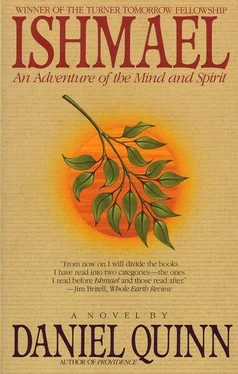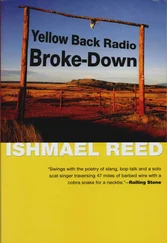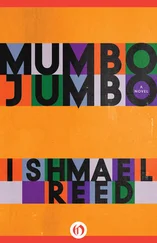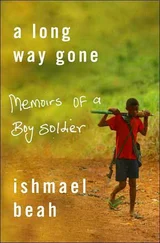“This is my impression as well. Takers believe in their revolution, even when they enjoy none of its benefits. There are no grumblers, no dissidents, no counterrevolutionaries. They all believe profoundly that, however bad things are now, they’re still infinitely preferable to what came before.”
“Yes, I’d say so.”
“Today I want you to get to the root of this extraordinary belief. When you’ve done that, you’ll have a completely different understanding of your revolution and of the Leaver life as well.”
“Okay. But how do I do that?”
“By listening to Mother Culture. She’s been whispering in your ear throughout your life, and what you’ve heard is no different from what your parents and grandparents heard, from what people all over the world hear daily. In other words, what I’m looking for is buried in your mind just as it’s buried in all your minds. Today I want you to unearth it. Mother Culture has taught you to have a horror of the life you put behind you with your revolution, and I want you to trace this horror to its roots.”
“Okay,” I said. “It’s true that we have something amounting to a horror of that life, but the trouble is, this just doesn’t seem particularly mysterious to me.”
“It doesn’t? Why?”
“I don’t know. It’s a life that leads nowhere.”
“No more of these superficial answers. Dig.”
With a sigh, I scrunched down inside my blanket and proceeded to dig. “This is interesting,” I said a few minutes later. “I was sitting here thinking about the way our ancestors lived, and a very specific image popped into my head fully formed.”
Ishmael waited for me to go on.
“It has a sort of dreamlike quality to it. Or nightmarish. A man is scrabbling along a ridge at twilight. In this world it’s always twilight. The man is short, thin, dark, and naked. He’s running in a half crouch, looking for tracks. He’s hunting, and he’s desperate. Night is falling and he’s got nothing to eat.
“He’s running and running and running, as if he were on a treadmill. It is a treadmill, because tomorrow at twilight he’ll be there running still—or running again. But there’s more than hunger and desperation driving him. He’s terrified as well. Behind him on the ridge, just out of sight, his enemies are in pursuit to tear him to pieces—the lions, the wolves, the tigers. And so he has to stay on that treadmill forever, forever one step behind his prey and one step ahead of his enemies.
“The ridge, of course, represents the knife–edge of survival. The man lives on the knife–edge of survival and has to struggle perpetually to keep from falling off. Actually it’s as though the ridge and the sky are in motion instead of him. He’s running in place, trapped, going nowhere.”
“In other words, hunter–gatherers lead a very grim life.”
“Yes.”
“And why is it grim?”
“Because it’s a struggle just to stay alive.”
“But in fact it isn’t anything of the kind. I’m sure you know that, in another compartment of your mind. Hunter–gatherers no more live on the knife–edge of survival than wolves or lions or sparrows or rabbits. Man was as well adapted to life on this planet as any other species, and the idea that he lived on the knife–edge of survival is simply biological nonsense. As an omnivore, his dietary range is immense. Thousands of species will go hungry before he does. His intelligence and dexterity enable him to live comfortably in conditions that would utterly defeat any other primate.
“Far from scrabbling endlessly and desperately for food, hunter–gatherers are among the best–fed people on earth, and they manage this with only two or three hours a day of what you would call work—which makes them among the most leisured people on earth as well. In his book on stone age economics, Marshall Sahlins described them as ‘the original affluent society.’ And incidentally, predation of man is practically nonexistent. He’s simply not the first choice on any predator’s menu. So you see that your wonderfully horrific vision of your ancestors’ life is just another bit of Mother Culture’s nonsense. If you like, you can confirm all this for yourself in an afternoon at the library.”
“Okay,” I said. “So?”
“So now that you know that it’s nonsense, do you feel differently about that life? Does it seem less repulsive to you?”
“Less repulsive maybe. But still repulsive.”
“Consider this. Let’s suppose you’re one of this nation’s homeless. Out of work, no skills, a wife the same, two kids. Nowhere to turn, no hope, no future. But I can give you a box with a button on it. Press the button and you’ll all be whisked instantly back to prerevolutionary times. You’ll all be able to speak the language, you’ll all have the skills everyone had then. You’ll never again have to worry about taking care of yourself and your family. You’ll have it made, you’ll be a part of that original affluent society.”
“Okay.”
“So, do you press the button?”
“I don’t know. I have to doubt it.”
“Why? It isn’t that you’d be giving up a wonderful life here. According to this hypothesis, the life you’ve got here is wretched, and it’s not likely to improve. So it has to be that the other life seems even worse. It isn’t that you couldn’t bear giving up the life you’ve got—it’s that you couldn’t bear embracing that other life.”
“Yes, that’s right.”
“What is it that makes that life so horrifying to you?”
“I don’t know.”
“It seems that Mother Culture has done a good job on you.”
“Yes.”
“All right. Let’s try this. Wherever the Takers have come up against some hunter–gatherers taking up space they wanted for themselves, they’ve tried to explain to them why they should abandon their life–style and become Takers. They’ve said, ‘This life of yours is not only wretched, it’s wrong. Man was not meant to live this way. So don’t fight us. Join our revolution and help us turn the world into a paradise for man.’ ”
“Right.”
“You take that part—the part of the cultural missionary—and I’ll take the part of a hunter–gatherer. Explain to me why the life that I and my people have found satisfying for thousands of years is grim and revolting and repulsive.”
“Good lord.”
“Look, I’ll get you started…. Bwana, you tell us that the way we live is wretched and wrong and shameful. You tell us that it’s not the way people are meant to live. This puzzles us, Bwana, because for thousands of years it has seemed to us a good way to live. But if you, who ride to the stars and send your words around the world at the speed of thought, tell us that it isn’t, then we must in all prudence listen to what you have to say.”
“Well… I realize it seems good to you. This is because you’re ignorant and uneducated and stupid.”
“Exactly so, Bwana. We await your enlightenment. Tell us why our life is wretched and squalid and shameful.”
“Your life is wretched and squalid and shameful because you live like animals.”
Ishmael frowned, puzzled. “I don’t understand, Bwana. We live as all others live. We take what we need from the world and leave the rest alone, just as the lion and the deer do. Do the lion and the deer lead shameful lives?”
“No, but that’s because they’re just animals. It’s not right for humans to live that way.”
“Ah,” Ishmael said, “this we did not know. And why is it not right to live that way?”
“It’s because, living that way… you have no control over your lives.”
Ishmael cocked his head at me. “In what sense do we have no control over our lives, Bwana?”
Читать дальше
Конец ознакомительного отрывка
Купить книгу












